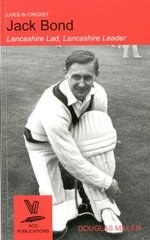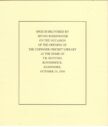Jack Bond: Lancashire Lad, Lancashire Leader
Martin Chandler |Published: 2010
Pages: 145
Author: Miller, Douglas
Publisher: ACS
Rating: 4 stars

Douglas Miller started the ball rolling in the ACS Lives in Cricket series back in 2007 when his life of Glamorgan all-rounder Allan Watkins appeared. Prior to that he had published two other cricketing biographies for Stephen Chalke’s Fairfield books, the subjects being another Glamorgan stalwart, Don Shepherd, and the former Leicestershire and Worcestershire amateur Charles Palmer.
Miller’s second contribution to the Lives in Cricket series is this biography of former Lancashire skipper Jack Bond. As a Lancastrian of a certain age the sense of anticipation when I opened this book was almost off the scale, but I have read all four of Miller’s books and while it is difficult for me to be entirely objective, I do believe Jack Bond – Lancashire Lad, Lancashire Leader to be the best, but all are excellent.
As Stephen Chalke demonstrated before Miller there are few rules to follow to in order to produce an outstanding cricketing biography, but those there are do need to be adhered to. The most obvious, but surprisingly frequently overlooked, is to pick an interesting character. Too many writers have fallen into the trap of assuming that because a cricketer enjoyed great success on the field that he is an ideal subject for a book. It does not necessarily follow nor, as each of Miller’s subjects demonstrates, is involvement in controversy a pre-requisite for an absorbing read.
Another key factor is to get to know your subject to the extent that you can say you understand him. Talk to him, to his family, teammates, friends and colleagues. This necessarily involves selecting someone who is still with us, and the best choices are in the autumn of their years and can therefore look back over a life well lived, as long as they aren’t afraid to speak their mind of course!
Authors must also bear in mind the trap of the “one chapter per season” trip through their man’s career. It can work reasonably well, although in my view is never the best approach, but when the chapters consist of nothing more than a repackaging of Wisden’s match reports interspersed with a few soundbites from contemporary newspaper coverage the result is usually tedious reading.
So what of Jack Bond? He is a devout Methodist and family man who first played for Lancashire in 1955 when he was 23. It took him a few years to establish himself, but he had a good season in 1961, and then scored more than 2,000 runs the following year. In 1963 however Wes Hall broke his arm early in the season. He came back but his batting never again reached the standard he set himself in 1962.
In 1968 the Lancashire committee turned to Bond to assume the captaincy. They had tried to sign Garry Sobers, but Notts had outbid them, and attempts to persuade either Alan Smith or former player Bob Barber to leave Warwickshire were unsuccessful, so Bond was fourth choice at best, and it was made clear to him that his role was as caretaker. He had always been popular with the rest of the team, and nothing changed there, but having secured the job he also demonstrated a thorough grasp of the skills needed for successful captaincy and above all the sort of dynamism and forward-thinking that made Lancashire, over the five years of his tenure, the most successful one-day side the county game has seen.
After relinquishing the captaincy for 1973 Bond became Lancashire coach, a move that was not successful, nor was the season he spent as Notts captain in 1974. After that he had a brief stint as an England selector before going “back to school” to coach. The final chapter of his cricketing career was a decade as a First Class umpire before, in 1997, he retired.
Miller follows the rules and tells Bond’s story with his usual skill, weaving into his narrative much material from the many interviews he did along the way. As with any good cricketing biography once I had finished the book I was left with the feeling that, not only did I know all about Jack Bond’s career, but also that I knew what made him tick, proof absolute that the biographer has done his job well.
The above said there is one aspect of the book that I found disappointing, and that is the way in which Miller dealt with the events that unfolded at Lord’s on Saturday 15 July 1972. The name of John Price is one that is rarely uttered today, but the Middlesex and occasionally England paceman was described by no less a player than Sunil Gavaskar as being responsible for the fastest spell of bowling he had faced. When he wrote those words Gavaskar had not yet encountered Dennis Lillee, Jeff Thomson or Clive Lloyd’s West Indians, but nonetheless his comment confirms that Price could be distinctly sharp. On a difficult wicket Price reduced Lancashire to 25-4, and in the process sent opener Barry Wood to hospital for a while with a jaw injury. Soon it was 54-6, and later 95-8. That Lancashire got to 215 was due to Bond’s unbeaten 103, his first century for seven years. I am sure I was by no means alone amongst Lancashire supporters in keeping my ear to the radio all afternoon as the updates came in, and in my unbounded delight when the news broke that the milestone had been achieved. Perhaps, Lancashire having lost comfortably enough in the end, the innings simply didn’t mean that much to the self-effacing Bond – but it was a big deal to his many supporters, and in my view warranted more than the couple of sentences Miller devotes to it.
But in truth that is a minor, and perhaps very personal quibble. Overall Jack Bond – Lancashire Lad, Lancashire Leader is a thoroughly enjoyable read. Inevitably it will appeal most to Lancashire supporters, but anyone who has an interest in the English game of the 1960s and 1970s will enjoy it, and even if it isn’t a mainstream book, and therefore I am constrained a little as to just how enthusiastic I can be in awarding a rating, it is still well worth four stars.






Leave a comment